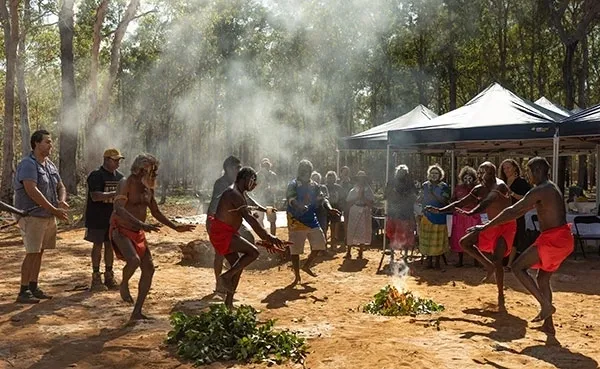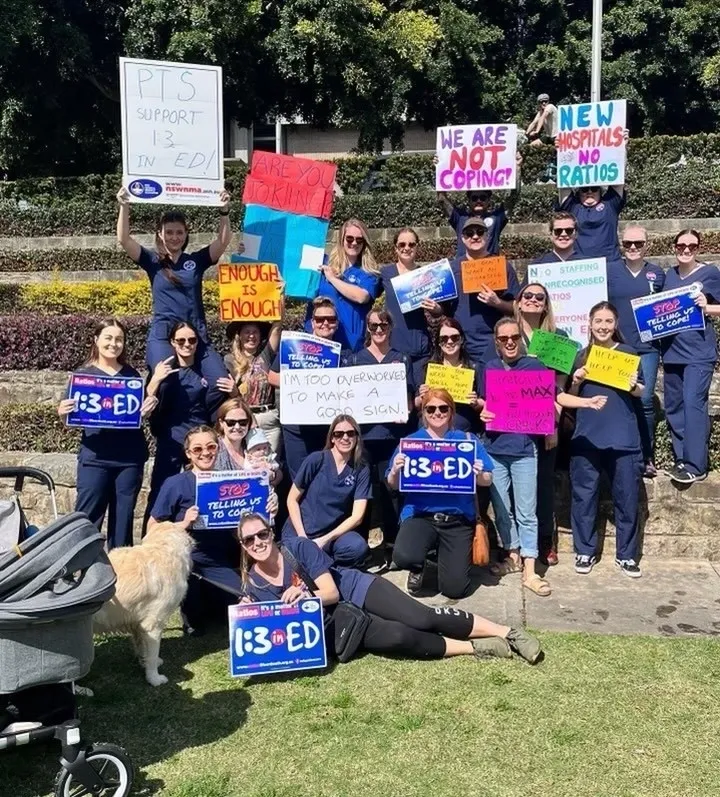
Australian oil and gas company Santos and elders from the Tiwi Land Council are currently waiting for a Federal Court decision to determine whether Santos can continue to drill gas wells in the Timor Sea.
By Harry Mulholland
The Federal Court case commenced in June after Tiwi Elder, Dennis Tipakalippa, launched action against Santos for a judicial review into the National Offshore Petroleum Safety and Environmental Management Authority’s (NOPSEMA) decision to accept Santos’s Barossa Drilling and Completions Environmental Plan (D&CEP).
Tipakalippa is seeking to have NOPSEMA’s decision to approve the drilling operation set aside claiming Santos has not reasonably satisfied the consultation requirements outlined under the Offshore Petroleum and Greenhouse Gas Storage Regulations 2009.
On Country
For the first time in Australia’s history, the Federal Court heard evidence on-Country in the Tiwi Islands from August 22 to 26. A final verdict is anticipated within a few weeks.
Since the case was presented to the Federal Court, Santos has ceased drilling in the Barossa Gas fields for 21 days as they await the court’s decision. If Santos wins the case they will be allowed to continue with its $4.7B project to produce natural gas from 2025.
Munupi Traditional Owner, Paulina (Jedda) Puruntatameri, who gave evidence in the case, said to the court, “If you are from Pitjamirra [on Melville Island], your songline connects you from here to the deep water.
“That’s where the turtles are. The Munupi clan have connection to the sea. They have turtle dance, they sing about the turtle. There’s a lot of iminga that are in the water… these are sacred sites that are not to be disturbed,” Puruntatameri said.
The on-Country hearing allowed the Tiwi people to tell their stories to the Federal Court on their terms, in a culturally appropriate way on Country where they are connected to their ancestors.
Environmental Defenders Office (EDO), the legal centre representing Tipakalippa, said the knowledge and expertise of First Nations witnesses was integral to their client’s arguments against the approval of Santos’s drilling licence.
Tiwi Islands Mayor and senior Munupi Traditional Owner, Pirrawayingi, told the court that Santos should have directly consulted the Munupi Traditional Owners.
“If something goes wrong, if there’s a spill… that is what our people are thinking about, the damage that will perhaps last for a long time, perhaps forever in a spiritual way to the people.
“We are holders of anything that’s on the sea, in the sea, under it and all its existence.
“It is part of us… when someone drills on the ground, on the land, or in the sea and it’s close to the proximity of your land and your boundary in a whitefella way that has been created, then when that drilling starts in our way, spiritually, they are drilling a hole inside our body,” Pirrawayingi said.
This sentiment was shared by Tipakalippa who said drilling into the seabed was like drilling into the Traditional Owners’ bodies.
“I’m relieved that Santos will drop drilling before it gets to the gas and will not start any new well. That is a big worry for us, so it’s very important to get that promise. This week, we have had our voices heard. We will fight to protect our Sea Country, from beginning to end.”
Stand off
EDO Special Counsel, Alina Leikin, said Santos had agreed not to hit gas in the Barossa field while they await a final decision.
“They have also promised not to commence drilling in any other wells at this stage.
“The court has heard compelling evidence … about the cultural and spiritual significance of this Sea Country, and what is at stake for Mr Tipakalippa and the Munupi Clan if the drilling plans proceed,” Leikin said.
Environment Centre NT Energy Campaigner, Jason Fowler, said Santos’s agreement not to drill into gas at the offshore Barossa gas field was welcome news.
“Not only is the Barossa gas field one of the most polluting offshore gas fields in Australia, but as we have heard this week, drilling holes through the seabed would cause cultural and spiritual harm to the Sea Country of the Tiwi people.
“The risks of this project, for the climate, for marine life, for the Traditional Owners, are simply too great,” Fowler said.
A spokesperson for Santos told The Point current drilling activities on the Barossa project were continuing in accordance with the undertaking with the Court.
The Barossa Gas Export Pipeline was intended to replace the current gas supply from the Bayu-Undan facility in Timor-Leste, and the gas extracted would be produced at Darwin LNG from the first half of 2025.
Carbon capture?
The existing pipeline from Bayu-Undan to Darwin would be repurposed for carbon capture storage (CCS) which Santos claims can store up to 10M tons on carbon dioxide each year.
In an interview with Rigzone, Santos’ Managing Director and CEO, Kevin Gallagher said the Darwin LNG Life Extension, Darwin Pipeline Duplication, and Bayu-Undan CCS projects would promote sustainable development and jobs growth in the Northern Territory and Timor-Leste while building momentum for a whole region carbon reduction solution.
“Taking a final investment decision on the Darwin Pipeline Duplication Project will allow for the Barossa project to be CCS ready.
“The Bayu-Undan CCS project has the potential to capture and store up to 10M tons of carbon dioxide per annum, equivalent to about 1.5 per cent of Australia’s carbon emissions each year from other projects, customers, and other hard-to-abate industries, and has the potential to be the largest CCS project in the world,” Gallagher said.
While Santos claims that the Barossa and Bayu-Undan CCS projects will contribute to reducing Australia’s emissions and boosting the economy in the Northern Territory, the Australian Centre for Corporate Responsibility (ACCR) filed allegations against Santos claiming they were greenwashing.
Greenwashing
The ACCR launched a Federal Court case last year alleging that Santos breached the Corporations Act 2001 and the Australian Consumer Law by using misleading and deceptive acts relating to its clean energy claims and the net zero plan in its 2020 annual report.
The case against Santos raised questions about the role of CCS and blue hydrogen in the transition to zero emissions, with EDO representing the ACCR in the case.
Some of the allegations raised against Santos included representations that hydrogen produced from natural gas with CCS was clean or zero emissions with the ACCR claiming that hydrogen produced this way would increase Santos’s greenhouse gas emissions, and that CCS could not practically capture all their increased carbon emissions using CCS.
Another allegation against Santos was that its net zero plan did not account for expected production and emissions growth from oil and gas exploration beyond 2025, with the ACCR claiming their net zero plan modelling only sought to make up the difference to net zero rather than reducing their overall emissions.
The ACCR said Santos was relying on receiving offsets for reducing their customers’ emissions to make their blue hydrogen meet their net zero target.
Commenting on the Federal Court case, ACCR’s Executive Director, Brynn O’Brien, said the litigation discovery process revealed further instances where ACCR contended that Santos engaged in greenwashing.
“We allege that Santos misled investors and the public about its plan to achieve net zero by 2040, and to produce zero-emissions blue hydrogen.
“The documents produced by Santos have heightened our concerns that these plans lacked sufficient detail to be put into the market.
“Investors rely on company disclosures and have a right to complete, open and honest information relating to a company they are investing in, or considering investing in.
“Unfortunately, ACCR isn’t able to share the Amended Concise Statement at this time.
“Santos has opposed the document being made freely available on the Federal Court website.
“We look forward to the court’s review and adjudication of Santos’s conduct,” O’Brien said.
EDO Senior Solicitor, Zoe Bush, said about 70 per cent of the ASX200’s market capitalisation was now covered by net zero claims.
“As companies rush to convince the market that they are part of the global energy transition, full and frank disclosure has never been more important.
“There are serious questions about the future of the gas industry in the face of the global energy transition.
“Gas companies such as Santos increasingly pin their hopes on carbon capture and storage and blue hydrogen to remain financially viable during that transition.
“It is critical that companies are transparent about the greenhouse gas emissions associated with these processes, and their risks and uncertainties.
“Misleading information can impede an effective and timely response to the climate crisis.
“It may also leave investors vulnerable to major losses and potentially unfairly skew the market away from companies that are acting responsibly,” Bush said.
The Federal Court case between Santos and the Munupi Traditional Owners is slated to recommence in Darwin on September 16 for arguments to be heard over an injunction on further drilling, and for a final decision.
WHAT YOU CAN DO
People looking to support the Munupi Clan in the fight against Santos can help by donating to the EDO to help them drive pivotal court cases to defend wildlife and climate, as well as help design better laws to tackle environmental challenges and empower communities to protect their local ecosystems.
Donations can be made on the EDO’s website.
Alternatively, opponents of Santos’s Barossa project can have their say on NOPSEMA’s website.
Users can leave their feedback through their online consultation hub, or they can send their comments via email to environment@nopsema.gov.au, or post them to GPO Box 2568, Perth WA 6001.
Community members can also fight greenwashing by avoiding the companies that either directly or indirectly posing as a green company.
One website the public can use to fight greenwashing is Ethical Consumer, a website that ranks companies and their products based on how eco-friendly they are.
They have information on many products such as energy suppliers, fashion brands, food and drink companies, health and beauty companies, home and garden companies, banks, retailers, technology companies and travel companies.
PETA and Good On You are two other examples of websites consumers can visit to see if a company is greenwashing.
PETA has a database full of information on what companies still test their products on animals, companies working for regulatory change and a list of cruelty free products.
Good On You is an ethical fashion database which can point users in the direction of clothing companies that are producing eco-friendly clothing manufactured without exploiting underpaid or child labourers.


